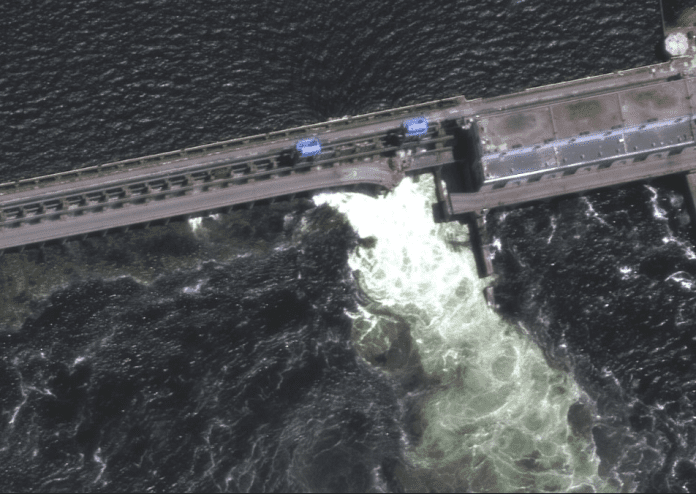News in brief: The Kakhovka Dam collapse in Ukraine has to a dispute between Ukraine and Russia over responsibility. The dam’s destruction affects agricultural irrigation in the region, potentially causing desertification.
The Kakhovka Dam in Ukraine collapsed after a significant portion of it was destroyed on 6 June 2023. Both countries involved in the conflict blame each other with Ukraine calling it a crime of ecocide by Russia. President Vladimir Putin accused Ukraine of destroying the dam itself.
Besides being the source of an hydroelectric power plant that employed 241 persons as of 2015, the dam is also responsible for several irrigation systems.
According to Ukraine’s Ministry of Agriculture, fields in the region will not see irrigation as the reservoir is disappearing into the Black Sea. Up to 584,000 hectares of agricultural land will be without water supply until the dam is repaired.
Without irrigation, these lands could turn into deserts by 2024. The problem is that the affected region, Kherson, is one of the country’s most fertile areas. Farmlands located there are responsible for a bulk of the watermelons that Ukraine produces. Also, they turn out tons of onions, tomatoes, sunflowers, soybeans and wheat. Even dairy farms will suffer from the lack of water.
A BBC coverage of the story mentioned that Russian officials said that the canal that channeled water from the reservoir to portions of Crimea under its control had already dropped. They claim that this gives Ukraine the motive to blow the dam.
In addition, Russian troops will have a hard time getting water locally if they remain in Kherson and the River Dnipro banks, which they occupied. So, forced evacuations tilts the argument in Russia’s favour.
Ukraine’s agricultural problems continue to expand and multiply as the conflict with Russia carries on. First, it was the logistics challenge of import, which the grain deal has provided a temporary solution to. Then, there are the threats of ban on imports by neighbors. Also, farmlands rigged with land mines are another challenge to the country’s agrarian earnings.
An International Food Policy Research Institute (IFPRI) report claimed that Ukraine has recorded about $34.25 billion agricultural loss to the war.



